
I've already written guides for some of Civilization VI's vanilla newcomer civs and leaders, so now I'm going to move onto one of the DLC civilizations that makes its first appearances in the franchise: John Curtin's Australia. This civ and leader are part of the "Deluxe Edition DLC". If you purchased the Deluxe Edition of the game, then you received this DLC (among others) for free when it was released. If you do not own the Deluxe Edition, then this DLC costs $5 USD.
Australia is currently the sixth largest country in the world (by land area) and is the only contemporary country that occupies an entire mainland continent. The continent was inhabited by the hunter-gatherer aboriginal Australians as long as 70,000 years ago, but very little is known about their history and culture. It is believed that they arrived on the continent via land bridges in Southeast Asia (probably connecting Indonesia and New Zealand to mainland Asia). The Dutch were the first Europeans to reach Australia in 1606, but it was the English that began colonizing the island-continent in 1788 to act as a penal colony in response to the recent American independence, which lead to a rapid decline in the native population. By the mid 1800's, Australia had ended the prisoner transport, and the colony began its transition into a full-blown nation.
John Curtin was the prime minister of Australia throughout most of World War II. He was appointed after the previous prime minister, Robert Menzies, was deposed by his own party. Curtin aligned Australia closely with the United States, which upset many British traditionalists, but proved instrumental in preventing the Japanese capture of the Philipines from turning into an invasion of mainland Australia. Curtin's leadership during the war, and his popular social service programs allowed him to coast to a mid-war re-election victory in 1943, but he did not complete that term due to rapidly-deteriorating health that lead to his death in 1944. He remains one of Australia's most beloved prime ministers.
DISCLAIMER:
Civilization VI is still very early in its life-cycle. Strategies for the game (and for specific leaders and civs) may change as Firaxis applies balance patches, introduces new features, or expands the game through DLC or expansion packs, or as the Civ community discovers new strategies. As such, the following strategy guide may change from time to time. I will try to keep it up-to-date, and will make notations whenever changes are made. I'll also post links in the official 2K forums and CivFanatics, where I'll also report any changes made. If possible and practical, I will try to retain the original content of the strategy for posterity.
I welcome any feedback or suggestions that readers wish to offer. Feel free to post on the linked forums, or by posting a comment at the bottom of the page.
This guide is up to date as of the Fall 2017 patch (ver. 1.0.0.194) (Southeast Asia DLC)
In Civilization VI, Australia is a civilization that favors expansion along coasts and wherever they have access to pasture animal resources. John Curtin is a defensive leader who can act as a sort of "sleeping giant" "world police", who can churn out a large military quickly if he is ever the target of a war or if he liberates another player (or city state) city.

John Curtin's uniques in Civilization VI
Australia's capital start bias: coastal, with cattle, horses, and/or sheep.

Australian civilization unique: Land Down Under
"+3 Housing in coastal cities. Pastures trigger culture bomb. Yields from Campuses, Commercial Hubs, Holy Sites, and Theater Squares are +1 in tiles with charming appeal, and +3 in breathtaking."
Australia heavily favors expanding along coastlines, near clustered pasture resources, and near mountains, cliffs, and natural wonders. All coastal cities automatically receive +3 Housing, which will allow them to grow a little bit larger earlier (assuming that you have enough amenities to support that growth). Tiles with high appeal will also improve the yield bonuses for holy sites, campuses, commercial hubs, and theater squares. Charming appeal tiles will grant a +1 bonus, and breathtaking tiles will grant a +3 bonus. Since mountains, cliffs, and natural wonders grant the highest appeal, you'll want to build the affected districts adjacent to those features, and preferably in positions in which they'll be able to receive their default adjacency buffs as well. It's not hard to get +6 Holy Site or Campus right at the start of the game!
One complicating factor of this ability is that your high-appeal tiles may already be occupied by districts by the time you can construct neighborhoods. This may slightly limit your max population size in your end-game cities, but the snowballing bonuses that you'll have been accumulating throughout the rest of the game will almost certainly make up for the few points of housing you may lose from having sub-optimal neighborhood placement.
The pasture culture bomb can steal tiles from other civilizations, if the tiles are within 3 from your city.
Lastly, Australia can also grow its borders very quickly by building pastures. Each new pasture will grant a culture bomb to Australia's borders that will instantly annex all adjacent tiles within the 3-tile radius from the city center, even if they belong to another player. You cannot use this culture bomb to annex tiles more than 3 tiles away from a city or to annex tiles that contain another player's completed districts or wonders. You can, however, use this culture bomb to steal tiles that contain districts or wonders that are still under construction, so you could hypothetically use this feature to stop a rival from completing a wonder -- or at least stall them. As far as I can tell, the A.I.s and city states do not seem to recognize that you have done this, and they don't seem to get mad at you for culture bombing them. A human player, on the other hand, is sure to notice, and will likely not be happy.
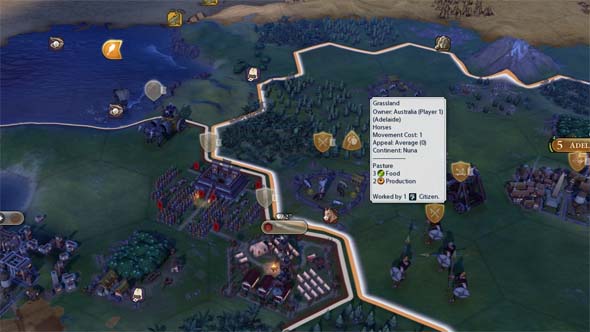
Districts and wonders cannot be captured by culture bombs.
John Curtin's leader unique: Citadel of Civilization
"+100% Production if either they have received a declaration of war in the past 10 turns, or if they have liberated a city in the past 20 turns."

John Curtin fills a sort of turtle world-police role. He is better off sitting back and waiting for a hostile rival to declare war on him than to actively declare war himself. Being the target of a declaration of war grants him a whopping 100 percent boost to production in all his cities for the next 10 turns. If you want to go to war with a rival, you should first try to provoke that civ into declaring war on you. Sadly, human players cannot use the "move your troops from our border" diplomatic message to force a declaration of war, which can be very obnoxious when an enemy is camping units within or adjacent to your borders but just won't actually declare war (I'm looking at you, Gilgamesh!)
It is critical to note that the effects of multiple war declarations do not stack! If two civs declare a joint war on John Curtin (or if a single civ and their multiple city states) in the same turn, Curtin's production bonus only lasts the same 10 turns as if only a single civ had declared war on him. Further, if another civ joins the war against Curtin midway through the duration of the production bonus, the bonus timer is reset to 10. It does not add 10 additional turns. So if a civ declares war on John Curtin 5 turns after another civ had already declared war on him, it will only reset the timer to 10 additional turns of production bonus. In this case, John Curtin will get 15 turns of cumulative production bonus, rather than being given 20 turns. As far as I know, the effect from liberating cities works the same way.
In addition, declaring war on somebody who has a defensive pact with a third civ does not force that third civ to declare war on Curtin, and so it does not trigger the production bonus. Lastly, as far as I can tell, John Curtin gets 10 turns of bonus production regardless of game speed, so you'll get a much bigger bang for your buck on quicker game speeds than on slower speeds.
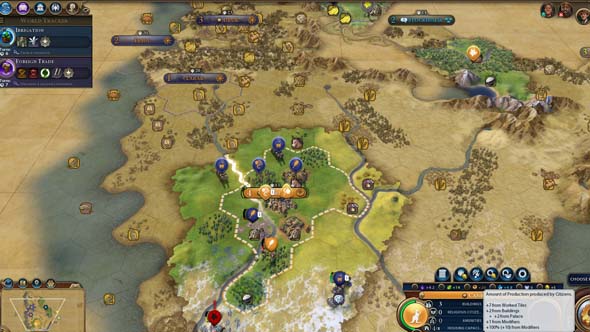
Players can't force another civ to leave their territory or declare war.
You have to wait for them to finally make the declaration themselves.
John Curtin also receives this production bonus whenever he liberates an occupied city. This includes conquered city states and other civilizations' occupied cities. The liberation bonus also lasts twice as long, which means that declaring against a warmonger in order to liberate some cities is probably better than waiting for that warmonger to declare on you. If you take this route, then try to find partners for a joint war in order to avoid warmonger penalties. If you can't get a partner to join you, then be sure to use a casus belli to mitigate some warmonger penalty. Liberating cities instead of capturing or razing them also has the benefit of avoiding high warmonger penalties. If you're lucky, you'll come out of the war with a huge production boost, and only minimal warmonger penalty, which will allow you to maintain friendly relations with the other civs in the game.
Unique improvement: Outback Station
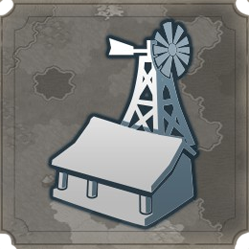
Game Info:
"Unlocks Builder ability to construct Outback Station, an improvement unique to Australia.
+1 food and +1 production. +1 food for each adjacent pasture. Additional food and production as you advance through the technology and civic tree for adjacent Outback Stations and pastures. Can only be built on desert, desert hill, grassland, and plains tiles."
Requirements: Guilds civic. Must be built on deserts, desert hills, grasslands, or plains.
Effects: +1 Food, +1 Production, +0.5 Housing.
+1 Food for each adjacent pasture.
+1 Production for every 2 adjacent Outback Stations (with Steam Power).
+1 Food from every 2 adjacent Outback Stations (with Rapid Deployment).
Outback Stations are most effective when placed in clumps around pastures, and are even better if located within clusters of pasture resources. Since building a pasture will culture bomb (annex) the adjacent tiles, you'll always be able to build Outback Stations around your pastures (unless someone like Jadwiga of Poland culture bombs the tiles back into her own empire). Each pasture will buff an adjacent Outback Station with additional food, and late-game techs and civics will boost the food and production yield for each Outback Station that is adjacent to two other Outback Stations.
To make it easier to recognize that these improvements should be clumped and build around pastures, the improvement's graphic includes a fence that encloses all adjacent Outback Stations and pastures so that they appear as one giant improvement (similar to a National Park).
Pastures do not have to be built adjacent to pastures. By default, they provide +1 food and +1 production, which means that they can be better than a farm in situations in which you can't build clustered farms. And if you build them in triangle patterns (similar to farms after the Fuedalism civic), they'll gain an extra food for being adjacent to two other Outback Stations.

Unique unit: Digger
Game Info: "Australian unique modern era unit that replaces Infantry. + 10 combat strength when fighting on coastal tiles. +10 combat strength when fighting on neutral or foreign territory."

Requirements: Replaceable Parts technology.
Replaces: Infantry.
Obsoleted: N/A,
Upgrades to: Mechanized Infantry.
Cost: 430 Production / 430 Gold [Standard speed].
Maintenance Cost: 6 Gold per turn.
Attack Type: Melee, Promotion Class: Melee,
Melee Strength: 72 (+2 from Infantry),
Movement Speed: 2.
Bonuses: +10 combat strength on coastal tiles.
+10 combat strength on neutral or foreign territory.
The Digger is a late-game Infantry replacement that specializes in doing battles on coasts and in foreign territory. These bonuses have both offensive and defensive applications. The bonus in foreign and neutral lands, obviously, will be beneficial if you are doing some late-game conquering. The coastal bonus can help against enemies with coastal cities and empires (and can be helpful when establishing a beachhead on another continent). But the coastal bonus can also be useful when defending your own cities, as most of your cities will likely be located along the coast.
I'd love to be able to report that Diggers are an excellent marine unit (and their specialization seems to imply that this should be the case), but sadly this isn't so. The Digger's coastal bonus does not even come close to offsetting the penalties from amphibious attacks -- even with the Amphibious promotion. If you foresee any ocean invasions in your future, you'll definitely want to invest in the Amphibious promotion with some Swordsmen or Musketmen. That way, by the time they become Diggers, you'll be able to immediately use them for amphibious invasions with no penalty. As of version 1.0.0.194, the amphibious promotion does not seem to work -- at least, not for Diggers. Even if the Amphibious promotion did work as intended, it still may not be enough to offset the strength reduction that is applied to embarked units, as that's actually separate from the amphibious assault penalty.
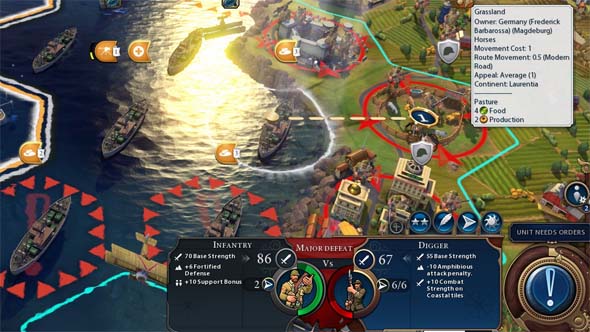
The Amphibious promotion offsets the penalty for amphibious attacks, and makes the Digger an effective marine.
The Amphibious promotion doesn't seem to work, so Diggers aren't particularly effective as marines.
The Digger also has a flat +2 combat strength over Infantry, which makes them a slightly-stronger all-around unit for any situation.
John Curtin, the Beachfront Prospector and World Policeman
Early explorations should focus on following the coastlines. Explore along the coast with your initial Warrior until you get a Scout, then send the Scout along the coast while your Warrior loops back around to explore the inland terrain near your capital. Inland explorations should be focused on finding pasture resources and high-appeal tiles (such as adjacent to mountain ranges or natural wonders). If you can find a location for a coastal city that has high-appeal tiles and pasture resources, then you've hit the jackpot, and you should settle there immediately!
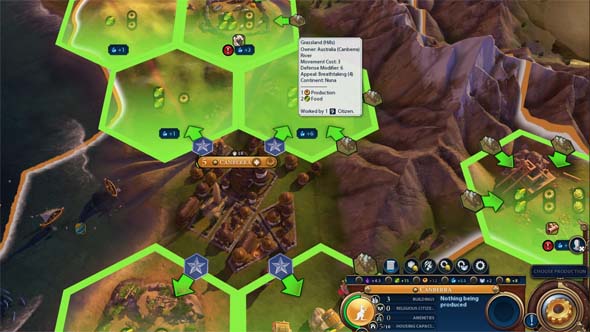
John Curtin will be looking for primo Australian beach real estate with pastures and high tile appeal.
Assuming you have a couple mountains or a natural wonder nearby, it should be very easy to find one or two tiles with "breathtaking" appeal. This will allow you to build early Holy Sites or Campuses with +5 or +6 yield, which can be a huge early-game advantage. Cliffs can be great places for Commercial Hubs and Theater Districts, as cliffs usually also have high appeal. Having a Commercial Hub on a cliff adjacent to a river and next to a Harbor adjacent to some sea resources would probably be ideal. A Theater placed on a cliff next to the city center, a Harbor, and a wonder or two (such as the Great Lighthouse, Colossus, or Mausoleum of Halicarnassus) will also be a potent culture-generator.
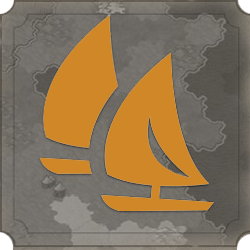
If you happen upon the Auckland and Nan Madol city states, then you should consider becoming their suzerain. Auckland provides +1 production on all shallow water tiles, and Nan Madol provides +2 culture from all coastal districts (including the city center). Since Australia will be looking for lots of coastal terrain for your cities (including the city center), these coastal benefits will be a decent boost. The production from Auckland will also be doubled if John Curtin's ability is ever activated, making your coastal cities very productive!
If you found an early pantheon, then there's a few beliefs that will likely be beneficial. Since you'll be focusing on coastal cities, the God of the Sea belief might be helpful if you have a lot of sea resources available. Dance of the Aurora or Desert Folklore can also be very potent if you have some high-appeal tiles adjacent to desert or tundra on which to place a Holy Site. And since you'll be looking for lots of pasture resources, then God of the Open Sky can be a really good pantheon too (isn't it always?). The Earth Mother pantheon (added in the Fall 2017 patch) can also be a decent fall-back, since you'll be looking for tiles with high appeal.

Getting sizeable early bonuses for Holy Sites can be a huge benefit to any religious victory plans, as it will allow Australia to pump out a lot of missionaries and apostles. Getting a sizeable early bonus from Campuses can likewise be a tremendous benefit towards the science victory (and, in fact, towards any victory, considering how strong technology is in the game). You'll still need a fair amount of production from multiple core cities in the late game in order to build your Spaceports and complete the mission projects necessary to complete the science victory.
If you don't have many breathtaking tiles, then the Eiffel Tower world wonder can be used to turn charming tiles into breathtaking tiles (and average tiles into charming). This can provide some extra late-game appeal-based boosts to your districts.
Build Outback Stations in clusters -- with, or without, pastures -- but ideally with pastures.
Industrial Complexes are not buffed by tile appeal, so you'll have to use regular old adjacency bonuses and buildings in order to increase your productivity. You can also take advantage of Outback Stations, and John Curtin's production buffs from certain types of war. Outback Stations will be very valuable to Australia and are almost always better than farms. Surround any pastures with Outback Stations wherever possible. If you don't have pastures, then you can still build Outback Stations in isolated places that have low food and/or production, and you'll want to be sure to try to build them in triangle clusters in order to get extra food.
Peacemonger ... or conqueror?
Being the target of a war declaration can actually be a pretty good thing for John Curtin, as it doubles the production output of all cities. If your army is pretty weak, you can use this bonus to train up some extra troops. Don't rely on building an army in response to war, as units are generally very expensive. You'll still want to maintain a decently-sized defensive army, even if you're planning a relatively passive turtle strategy. Instead, it's generally better to use the production bonus towards infrastructure, and then spend gold or faith on new units (if possible).
Maintaining a sizable standing army also allows John Curtin to act as a world policeman against military runaways -- a role that he excels at, especially in the later game. Liberating cities also grants a production bonus, and John Curtin can use this power to slowly liberate cities and keep this production bonus running for as long as an opponent has captured cities under his or her control, or for as long as your war weariness allows you to. Liberating cities should earn you lots of friends and allies around the world, which will hopefully offset any minor warmonger penalties that you may have accumulated from long, drawn-out conflicts.
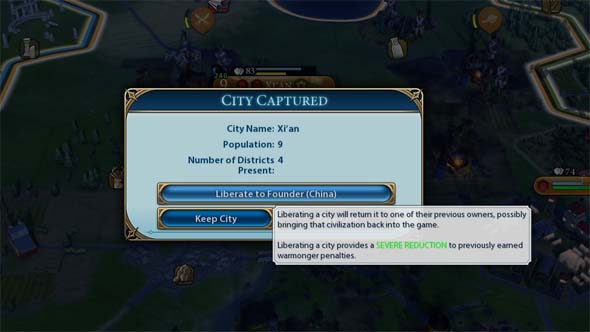
Liberating captured cities will grant John Curtin a huge production boost, as well as foster good diplomatic relations.
The unique Digger unit can be a situationally decent late-game unit for conquest and defense, but its coastal focus means that it's very map-dependent. If you're planning on taking a lot of coastal cities, then the Digger is pretty good. Unfortunately, the coastal bonus is very narrow in its usefulness. Move one tile inland, and it's gone. You'll still get a bonus for fighting outside of your borders, but it's a pretty small bonus -- better than nothing, I guess.
You don't have to focus on peacemongering and world-policing. You can also use Curtin's bonuses for Domination victory. Liberate the occasional occupied city (or city state) from your enemies (if possible), but keep any major civ capitals that you conquer. Use the production bonuses to build a massive military, and sweep across the map.
The Digger may be a bit "meh", but with John Curtin's production bonuses, you can easily spam a whole lot of them, and turn them into more powerful corps and armies. This applies to all units after having researched Nationalism. If you can quickly build new units, you can attach them to your promoted units that have been upgraded from earlier eras in order to have powerful, well-promoted corps and armies. The same goes for naval units and fleets if you're on a map in which navies are relevant.
Don't start what you can't finish: Playing against John Curtin
John Curtin's A.I. agenda: Perpetually on Guard
"Forms Defensive Pacts with friends and likes civilizations that liberate cities. Dislikes civilizations in a war that are occupying enemy cities."
John Curtin can be a dangerous opponent. If attacking him, you need to be sure that you have enough military force ready to swiftly capture his cities before he can muster an army. You should also pay attention to any alliances or defensive pacts that are formed so that you don't drag Australia into a conflict that you don't want them involved with. Also be very cautious of accepting any joint war proposals against him. A human player especially will likely focus on liberating captured cities, so be sure that you can defend your conquests. And if you're unsure of whether you can defend a captured city, you should probably raze it in order to prevent John Curtin from being able to liberate it.
Australia is also a potent competitor for other victory types. If he is lucky enough to get lots of high-appeal tiles near his cities, then Curtin will enjoy some decent bonuses to science, gold, culture, and/or faith. Be very wary of early war declarations against him unless you can hit him with overwhelming force, as that production bonus could allow him to quickly build districts on high-appeal tiles to reap the benefits, or to train a large army for his own conquests.
Also be wary of any borders you share with John Curtin. If there are pasture resources along the border, then Curtin can culture bomb and steal your land. This can be damaging if the stolen tile(s) contain luxuries necessary for maintaining positive amenity, or if the tile contains your first or second copy of a particular strategic resource. Remember that Curtin's culture bomb cannot steal tiles that are more than three tiles from one of his cities, and he cannot steal tiles that contain completed districts or wonders. A human player may use forward-settling and culture bombs to try to antagonize you into war. Don't fall for it unless you are confident that you can beat him. Call his bluff and try to get him to declare war on you instead, thus preventing him from getting his 100% production boost.
Of course, if you want to take him down, you can always wait for another player or A.I. to declare war on him, then declare war yourself. The production bonus doesn't stack with additional declarations (though it may prolong the duration of the bonus), so piling on once he's already at war is a safer move.
Put simply: don't declare war on John Curtin unless you intend to see the war through! If you can't quickly defeat him, then it's probably best to leave him be.
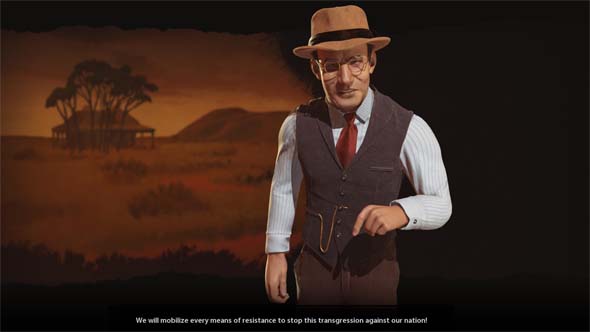
Forcing Curtin to declare war on you will avoid his production bonus,
just don't let him liberate any cities you've captured!
Discussion and change log
Thank you for reading! I hope this strategy helps you build an Australian civilization to stand the test of time!
[Show Change Log] [Hide Change Log]
9 August, 2018
Added start bias.
Added "Discussion and change log" section.